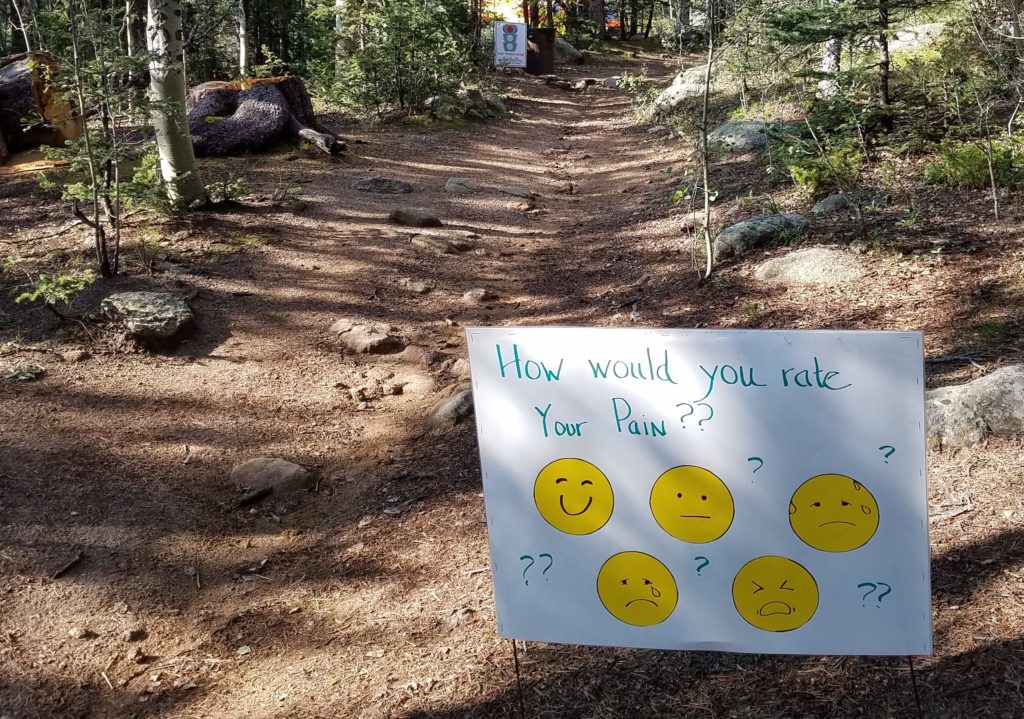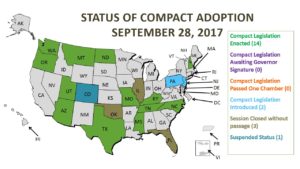As winter comes to a close, you might be wishing you were on an island somewhere…. if you’re a travel PT, you may have that option on your next assignment. Here’s (more than) 4 opportunities that could have you living on an island soon. Lots of links included to articles from when I worked on and visited several of these islands.

Kate hiking down from the 10,000 ft summit of Haleakala on Maui to camp in the base of the volcanic crater many hours and miles later that night in 2014.
Hawaii
Let’s not bury the lead. Hawaii is a tropical paradise within the borders of United States. All the advantages of really getting off-the-grid without any of the hassles or insecurities of international travel. Within Hawaii, there is a wide spectrum of opportunities – from uber-urban living to the very rural – a little different flavor for whatever your taste is.
Oahu is the main island and generally a good place for anyone unfamiliar with Hawaii to start. Oahu is home to about 1 million people, many of whom live and work in Honolulu, a major city and international hub. Honolulu offers all the perks and culture of a big city with the world famous surf beaches of the North Shore a short 30 minute drive away. Traffic can be brutal on Oahu, so plan commute between home and a potential job appropriately
Maui and Kauai each have occasional assignments available and tend to be a happy-medium for the traveler seeking a mix of social life and rural island-living. Both islands have thriving communities and also places you can quickly get off the beaten path. Each island has grown a bit in recent years, but also have huge swaths of land preserved for their beauty and recreation. On Maui, much of that land is within Haleakala National Park. Haleakala is a 10,000 ft volcano with astronomy observatories on top and it’s flanks running straight into the ocean. On Kauai, few views on Earth rival those of the Napali Coastline – a stretch of steep cliffs and secluded beaches spanning the coastline between where the two ends of the road circling the island end. I really believe you can’t go wrong with any opportunities that arise on Maui or Kauai.

Mother nature hard at work creating more land on the Big Island through the eruption of Kilauea volcano and lava running into the ocean in 2016.
The Big Island, which is actually named “Hawaii”, has it all. The Big Island is about 70 miles across and boasts 13,000 foot peaks, an active volcano, some of the best scuba diving in the world, and a thriving biking/running/swimming community that hosts the Ironman World Championships each year in October. Kona on the dry West coast of the island, and Hilo on the Eastern wet side of the island are the two major towns – each have a pretty steady stream of revolving travel assignments available.
When finding a travel PT assignment in Hawaii, luck and timing play big roles. Sometimes, very few jobs are posted, while at other times, you’ll find many jobs. Waiting just a few weeks typically resolves any drought of jobs, but be cautioned that Hawaii assignments draw a lot of applicants, so bring your A-game to the interview. Also worth noting that pay in Hawaii can be low… but you’re working in Hawaii, so….
Martha’s Vineyard

On the beach below the Gay Head cliffs on Martha’s Vineyard in 2015.
Martha’s Vineyard, off the coast of Cape Cod in Massachusetts offers the true island-living experience. In the summertime, people are intent on fishing, beaching, and… outdoor showers? I believe that nowhere in the world is as passionate about outdoor showers than the people of Martha’s Vineyard. When assessing function and patient goals on my home health assignment on Martha’s Vineyard, it was not rare to have a primary goal for a patient to return to their outdoor shower. When Kate and I lived in a camper there, we caught the fever – although we had a shower in our camper, the campground opened a row of 6 outdoor showers, and we indulged daily, rarely, if ever, using the indoor shower.
Martha’s Vineyard Hospital and the Martha’s Vineyard office of VNA of Cape Cod often have openings because affordable housing is near-impossible on the Vineyard. Many of their permanent employees travel 45 minutes by boat everyday from The Cape for work. If you can figure out housing on The Vineyahd, you’ll have a great time. Also worth mentioning, the Cottage Hospital on Nantucket, a couple hours by boat from Martha’s Vineyard, also regularly seeks travelers.
St. Thomas
The US Virgin Islands are part of FSBPT. Like any state, you can apply for a license in the Virgin Islands. St. Thomas is the main island and has historically had good availability for jobs. The Virgin Islands are definitely for the more adventurous traveler, or, perhaps, for the traveler who wants a tropical experience, but doesn’t care for the long distance to Hawaii. Most people on St. Thomas speak English, but Creole or Spanish may be primary language of some patients. I have read about concerns of safety, but travelers who have worked there tell me that if you are smart about your surroundings and company, then it is safe…. and highly enjoyable – basically like any major US city.
Hurricanes Irma and Maria may have changed the travel experience on St. Thomas. Largely overshadowed by the destruction in Puerto Rico, the Virgin Islands got hit hard as well – in fact, the roof ripped right off the hospital in St. Thomas during Irma. As best I can tell sitting at my computer in Colorado, it appears there is still an ongoing need for travel PTs in St. Thomas – it also appears there are many volunteer opportunities to continue helping with hurricane recovery. It’s worth mentioning that Puerto Rico is also under the umbrella of FSBPT, so you might consider volunteer work in Puerto Rico as well.
Alaskan Islands
With more coastline than the entire rest of the US, there are many way-off-the-grid island opportunities in Alaska, but here are a few standouts.

Looking across the town of Sitka at Mt Edgecumbe, a dormant volcano. Also, I remember Sitka having a great brewery!
Kodiak Island currently has travel PT needs. Kodiak is 100 miles long and has a population under 14,000 making it a true outdoorsman’s paradise. Kodiak is best known for the Kodiak Brown Bears, which alongside polar bears are the largest bears in the world. Kodiak has ample fishing, hiking, hunting, and anything else you can imagine outdoors. Though, it is not for the faint of heart – no one is around to bail you out if you get yourself in trouble out in the wilderness. But for the therapist looking for a truly rugged off-the-grid experience, Kodiak could be a dream assignment.
Sitka, on Baranof Island, was the capital of Alaska back when the state was a part of Russia. On our way back from working in Anchorage, Kate and I stopped off to visit a PT friend there and quickly fell in love with the community. Sitka is a vibrant town with architecture reminiscent of it’s Russian past. Our friend took us down to a park to watch for whales, and sure enough, we quickly saw a pod of Orcas swimming by in the bay. Sitka has excellent access to the outdoors both in the mountains and on the ocean. Compared to most of the rest of Alaska, Sitka is relatively Southern and therefor more temperate.
If you are willing to make a longer-term commitment (starting at 2 years) in Alaska, there are opportunities to make substantially more money in the form of student-loan repayment. These opportunities are available both in private and government facilities through a government program called SHARP. When working for large health systems in Alaska, there can also be opportunities to take small planes out to remote bush towns reachable only by sea and air. PTs fly in to provide rehab to the residents for a couple days at a time. While I don’t think a typical 13 traveler in Alaska is likely to be sent out to the bush, it might become more possible to make these trips after extending a contract for a longer period.

Mendenhall Glacier in Juneau Alaska, 2012…. not technically on an island, but you can only get there by boat or plane.
There are many more islands all over the country where you can find work as a traveling therapist. Jobs exist off of Texas, in the Northwest corner of Washington state, off the far Northeast coast of Maine, and down in the Florida Keys. If you look, you will find the island that suits you fancy. Happy travels, and good luck turning those island dreams into your real life.







 The answer: I don’t know what is best for you!!!! These are personal decisions that rely on the balance of many different factors. The right assignment for you may be very different than what somebody else wants. To be successful in travel therapy, you need to be flexible where you can, but you also need to know what is important to you and pursue it. I’d like to explore a few of the factors that will play into you choosing the assignment that is (hopefully) the best one for you.
The answer: I don’t know what is best for you!!!! These are personal decisions that rely on the balance of many different factors. The right assignment for you may be very different than what somebody else wants. To be successful in travel therapy, you need to be flexible where you can, but you also need to know what is important to you and pursue it. I’d like to explore a few of the factors that will play into you choosing the assignment that is (hopefully) the best one for you.
 Pay
Pay In this piece, The Vagabonding DPT and HoboHealth are teaming up for the 3rd time to present to you the major red flags we look for when choosing a staffing agency or when choosing to accept a specific travel assignment. These red flags shouldn’t be treated as absolute no-no’s for taking an assignment or using specific recruiters, but they should make you pause and think, “Is this what I want in an assignment?” If you run across these red flags, your antenna should perk up and you should be asking yourself if it is the right situation for you.
In this piece, The Vagabonding DPT and HoboHealth are teaming up for the 3rd time to present to you the major red flags we look for when choosing a staffing agency or when choosing to accept a specific travel assignment. These red flags shouldn’t be treated as absolute no-no’s for taking an assignment or using specific recruiters, but they should make you pause and think, “Is this what I want in an assignment?” If you run across these red flags, your antenna should perk up and you should be asking yourself if it is the right situation for you.






